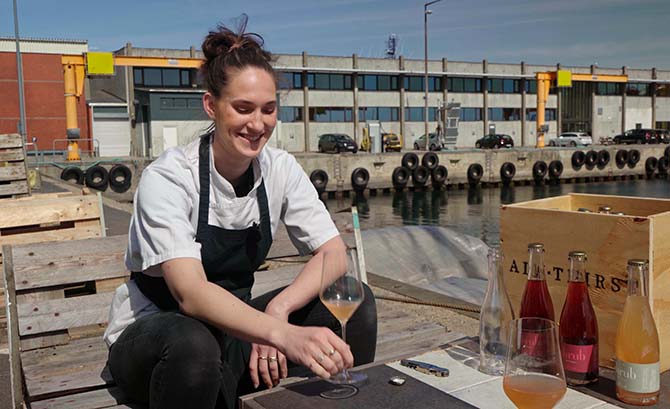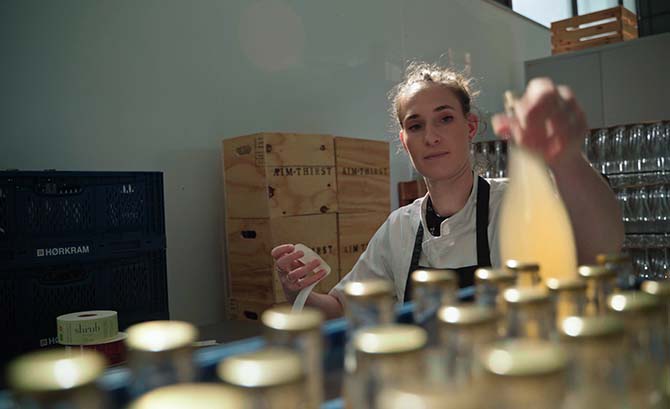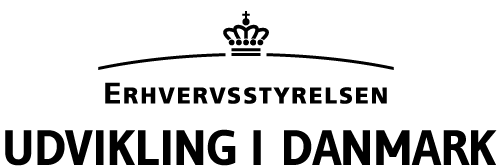NB. Udbyderen af servicen sætter cookies på din computer, når du afspiller eller deler videoen. Læs mere om cookies.
More and more female entrepreneurs emerge in Denmark. One of them is 30-year-old Mia Hjorth Hansen, who founded the company AIM Thirst in Grenaa, where she has brewed the alcohol-free drink Shrub for three years and sold it to restaurants and hotels., She is now ready for the next step.
“I have had a clear strategy from the start: To get customers who are stable and whom I look after properly – but the manual production takes a lot of time, and it would be a good solution for me to find a business partner in the production so I can focus on sales and customers – and if that means handing over some of the company, that's ok,” Mia Hjorth Hansen says.
Therefore, Mia Hjorth Hansen plans to apply for an individually adapted NextStep course in the large EU-supported project Iværksætterdanmark. She knows the EU project from a shorter course in 2021, when her company was newly started. Here she gained knowledge about, among other things, target groups, customer care and work-life balance. The latter is extremely relevant for the young entrepreneur who, in addition to her production in Grenaa and customers around the country, also manages a full-time job as a bar manager in Aarhus.
The courses in Iværksætterdanmark contributed to her finding a suitable balance between work, the company, family, and friends.
"But if I'm going to continue, I must spend more hours on the customers, and since I can't conjure up more hours in the day, I have to find a business partner. I need competent feedback and advice in the process, and in this regard, it is fortunate that I know Iværksætterdanmark," Mia Hjorth Hansen explains.
Mia's challenges and dilemmas are echoed by the thousands of entrepreneurs who have participated in courses in Iværksætterdanmark. The EU project was initiated by the Danish Board of Business Development in 2020 with DKK 20.8 million in support from the EU’s Social Fund and the decentralised business promotion funds.

For just over two years, Mia Hjorth Hansen has run her company AIM Thirst alone – alongside her full-time job. She is now considering her next step, which will probably be an individually adapted NextStep course in the EU project Iværksætterdanmark. Photo: Rostra Kommunikation
The objective was to strengthen the broad group of entrepreneurs with tailored competence development that can ensure survival and development in the entrepreneurs’ companies. The project is run by the Danish business hubs, and project manager Emil Ødegaard from Erhvervshus Hovedstaden is proud of the reach:
“We are present everywhere in the country and we are for everyone – with or without a CVR number. We do not only aim at growth entrepreneurs but also at those who want to start a small business, perhaps with own income or a single employee. The hairdresser, the auto mechanic – all the functions that are needed in a smaller town.”
4,400 entrepreneurs all over the country have participated in one or more courses in the project since the start. In 2021, the Danish Board of Business Development expanded the project with DKK 60 million from REACT-EU. The extra funds have primarily been used for 1,637 extra NextStep courses, through which entrepreneurs receive advice and feedback through individually tailored courses.
Currently, 671 entrepreneurs have been approved for a NextStep course and 93 of them have completed the course. Project manager Emil Ødegaard:
“NextStep is for those entrepreneurs who, like Mia, need to move on and are ready to create growth. In the process, she can draw on a growth guide, and she can receive subsidies to buy relevant competence development as needed.”
Denmark needs more entrepreneurs all over the country, and in particular, Denmark is lagging behind in terms of female entrepreneurship, figures from the Danish Chamber of Commerce show: Only 5 per cent of the Danish women between 18 and 64 embark on becoming an entrepreneur, and this is below the average in the OECD countries. And for every 10 men who become entrepreneurs, only 6 women start out on their own.
That is why the REACT-EU funds were accompanied, among other things, by a requirement to focus on getting more female entrepreneurs involved in Iværksætterdanmark:
“With Iværksætterdanmark, we have succeeded in breaking the negative spiral. From the start of the project, women have been the majority, and at our NextStep courses, 52 per cent of the entrepreneurs are female,” project manager Emil Ødegaard says.
The experiences from Iværksætterdanmark contribute to the image that female entrepreneurs in Denmark are catching somewhat up: From 2020 to 2022, the proportion of women who expect to start a new business increased from 2 per cent to 7 per cent, figures from the Danish Chamber of Commerce show. And there is good reason for fertilising the ground for female entrepreneurship, the analysis shows: Companies with female founders generate 25 per cent higher turnover per Danish Krone invested than companies founded by men.
So, what is holding the female entrepreneurs back? Primarily the fear of not having a fixed income and of lacking the right competences, the analysis from the Danish Chamber of Commerce shows. Mia Hjorth Hansen recognises this, and the shrub entrepreneur adds:
“It is also important to know if you are personally going in the right direction. What am I passionate about? Where do I shine? I have long since recognised that I think it is the most fun to be creative and meet other people – and that it is less fun to have to stand for many hours and produce. You hear of many entrepreneurs who suddenly don't think it's fun anymore. I’m aware of the possibility that this could also happen to me, and therefore, I need sparring and advice.”

Mia Hjorth Hansen has found a place in the market for her shrub – a sour, fermented fruit drink that has become a tasty alternative to wine in restaurants. She produces her shrub at her own premises at the harbor in Grenaa. Photo: Rostra Kommunikation
FACTS About Iværksætterdanmark
Iværksætterdanmark is the business hubs’ nationwide initiative for all entrepreneurs. The overall objective of the project is to support a broad improvement of competences among entrepreneurs to increase the number of new entrepreneurs and increase their survival rate. The focus of the project is particularly green and sustainable entrepreneurship as well as female and skilled entrepreneurs.
This happens in three types of courses:
- Courses to strengthen entrepreneurs' professional competences in the most important general areas
- Industry- and theme-oriented courses adapted to local conditions
- NextStep courses targeted entrepreneurs capable of execution
The Danish Board of Business Development has supported the project with DKK 20.8 million from the EU’s Social Fund and the decentralised business promotion funds and DKK 60 million from the REACT-EU funds. The project started in August 2019 and with the support from REACT-EU, the project has been extended until June 2023.
Read more about Iværksætterdanmark (in Danish)
Read more about Iværksætterdanark at the project's website (in Danish)
FACTS About the EU’s Social Fund
From 2014-2020, the EU's Social Fund, Regional Development Fund and Danish partners invested DKK 1 billion each year in activities to create growth and employment throughout the country. The Social Fund programme for 2014-2020 targeted entrepreneurship, education, and social inclusion to create more new businesses and a more skilled workforce. These are essential prerequisites for increased productivity, competitiveness, and growth.
Therefore, the EU’s Social Fund co-financed projects, which should:
- Increase entrepreneurial activity and ensure growth-oriented competence development in small and medium-sized companies
- Promote social inclusion – via specially designed youth education, integration courses into the labour market and social economic businesses
- Strengthen vocational and higher education

